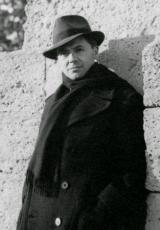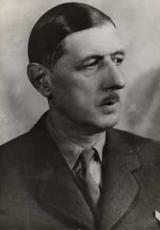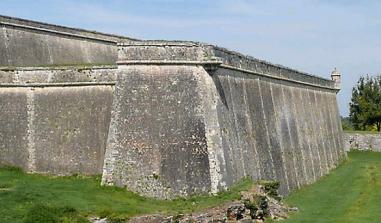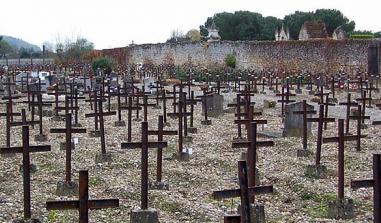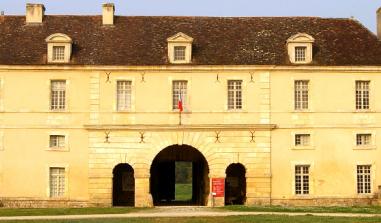Centre Jean Moulin
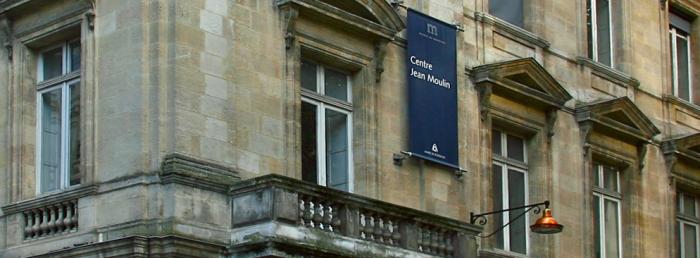
Centre national Jean Moulin. © F. Encuentra /CNJM Bordeaux
The Centre National Jean Moulin is a World War II documentation centre and museum that houses three floors of collections dedicated to the Resistance, Deportation and the Free French Forces.
Established in 1967 on the initiative of Jacques Chaban-Delmas, Order of the Liberation, National Military Delegate of General de Gaulle in Vichy France, the Centre National Jean Moulin is located on the premises of the former Caisse d'Epargne de Bordeaux, a building constructed in the mid-19th century.
Born in Béziers in 1899, Jean Moulin was, upon the completion of his law studies, the youngest permanent departmental ministerial representative in France, before becoming the youngest prefect in France. At the time of the debacle of June 1940, he was prefect of Chartres where he accomplished his first act of resistance on 17 June. He left for London after being deposed by the Vichy government. Moulin was parachuted into Provence on the night of 1 January 1942 with two sets of orders - one civil, the other military - and was in charge of coordinating movements by the Resistance, as well as forming a secret army. Moulin, the first president of the National Resistance Council, was arrested in Caluire on 21 June 1943. After being tortured, he died during his transfer to Germany. Since 19 December 1964, his ashes have been kept at the Panthéon.
Jean Moulin was also an art lover and an artist in his own right who, under the pseudonym of Romanin, published caricatures, created etchings and painted watercolours.
The Resistance 18 June 1940: A day after arriving in London, General de Gaulle makes his appeal. 2 July 1940: France is divided in two by a demarcation line: the area north of the line is occupied by German forces, while the area south of the line, controlled by the government of Pétain in Vichy, would also be under occupation from 11 November 1942. Those who refused to live under German control became members of the Resistance. Members of the Resistance were not soldiers; they were anonymous and clandestine volunteers without uniforms. Faced with the Resistance, the German system of repression was overwhelming, with the secret police service, the Gestapo, at times acting with the assistance of French citizens deceived by propaganda from Nazi collaborators, in particular the militia. While combat between the two sides was unequal, patriotic enthusiasm more often than not made up for inexperience, unfortunately at a heavy price.
The Free French Forces From July 1940, General de Gaulle, now based in London, formed his general staff, notable members of which included Dewavrin (Passy), Roulier (Rémy), Duclos (Saint-Jacques), Fourcaud, d'Estienne d'Orves, and others. These 'first men of London' would form the Central Information and Action Bureau (BCRA). At the same time, General de Gaulle regrouped and organised under his command the remnants of the French army that had managed to evade German capture. Those that volunteered would make up the army, navy and air force of Free France that would fight alongside Allied forces.
Deportation Concentration camps were one of the first institutions created by the Nazis when Hitler came to power in 1933. Terror, which had earlier been developed by paramilitary Nazi groups (S.A. and S.S.), became legal. The regime's most hostile opponents were arrested and interned. German authorities in France used deportation from the earliest days of the Occupation. The first to be deported were those being held in camps in the south of France (Austrians and Germans, political refugees, combatants for international brigades and Spanish Republicans, foreign Jews), then the inhabitants of Alsace and Lorraine who resisted Germanisation. Soon afterwards, all Jews and opponents (Gaullists, communists and members of the Resistance) would suffer the same fate.
Permanent collections The Centre National Jean Moulin is a World War II documentation centre and museum that houses three floors of collections dedicated to the Resistance, Deportation and the Free French Forces. The Centre National Jean Moulin is a place of great historical importance that also looks to the future, contributing to learning and research. The Centre is also a documentation centre within a museum, offering the public access to documents from the period (posters, clandestine correspondence, weaponry, etc.) and objects which remind visitors of that period in our recent history and help them to understand the different networks that were formed and to appreciate the efforts made by all concerned in the name of freedom. The Centre also holds exhibits, special studies and organised activities. The Centre National Jean Moulin also welcomes artists, in particular in the context of the 'Nuit et Brouillard' exhibit by Jean-Jacques Morvan, war paintings by Bordeaux painter Edmond Boissonnet and the enamel works of Raymond Mirande.
The Centre is open to the general public all year round for visits with commentary (groups of 5 or more on appointment). For school students, the Centre's education service, which is managed by an agrégé history-geography teacher, offers theme-based and/or general visits with commentary (on appointment). A reference library containing books and documentary albums on collections housed in the museum is open to adults and students. Postal address: 48 rue Vital-Carles 33000 Bordeaux E-mail: cnjm@mairie-bordeaux.fr Tel: 33 / 05.56.10.19.90 / 05.56.10.19.92 Fax: 33 / 05.56.10.19.91 Open Tuesday-Sunday From 14:00 to 18:00. Closed Mondays and holidays Free admission
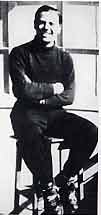
Jean Moulin 1933. Source : Photo CJM Bordeaux
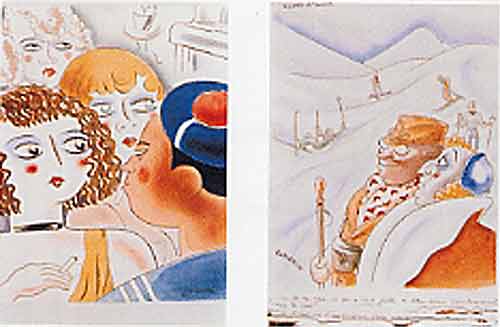
Le marin aux trois filles et "les sports d'hiver" par Romanin. Source : Photos CJM Bordeaux
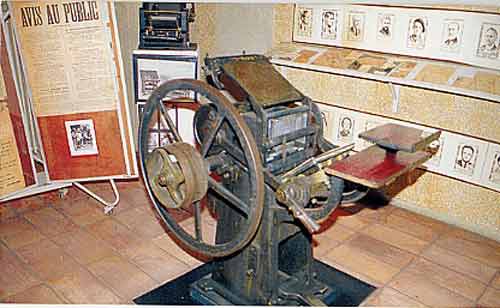
Presse clandestine de l'imprimerie Cadillon (Bourg sur Gironde). Source : Photo CJM Bordeaux
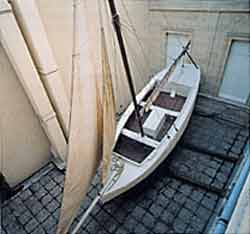
Le "Sils te mordent", bateau d'évasion. Source : Photo CJM Bordeaux.
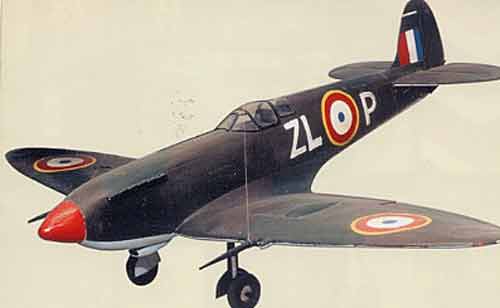
Le spitifire, chasseur monoplace anglais. Source : Photo CJM Bordeaux
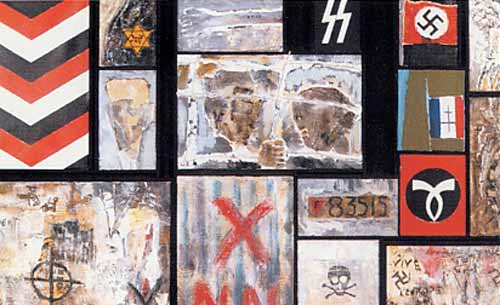
Extrait de "Nuit et Brouillard" de J.J. Morvan. Source : Photo CJM Bordeaux
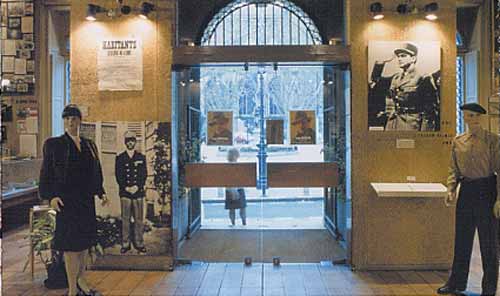
L'espace d'exposition. Source : PHoto CJM Bordeaux
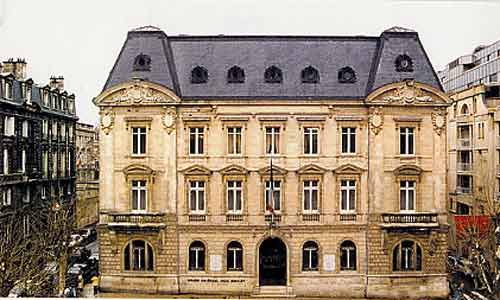
Façade du centre Jean Moulin. Source : Photo CJM Bordeaux
Practical information
48 rue Vital-Carles 33000
Bordeaux
Tel : 05.56.10.19.90 ou 05.56.10.19.92Fax : 05.56.10.19.91
Ouvert du mardi au dimanche de 14h à 18h
Fermé lundi et jours fériés


